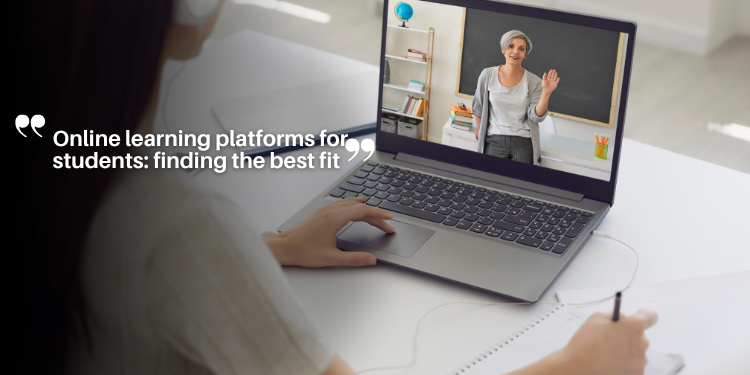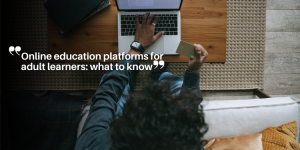Online learning platforms for students: finding the best fit

Online learning platforms for students include features catering to various learning styles, time management strategies, and solutions to common challenges like technical issues and isolation, enhancing overall educational experiences.
Online learning platforms for students have transformed education, making learning accessible from any place. Think about your unique needs—what features matter most to you? Let’s dive in!
Understanding online learning platforms
Understanding online learning platforms is essential for students seeking flexibility in their education. With various options available, it’s important to know what features to consider when choosing the right platform.
Key Features of Online Learning Platforms
When exploring these platforms, look for a few key features that can make a big difference in your learning experience. These include:
- Interactive content: Engaging lessons that captivate your attention.
- Easy navigation: A user-friendly interface that helps you find materials quickly.
- Support resources: Access to tutors and forums for questions and assistance.
Additionally, consider how well the platform tracks your progress. Being able to see your improvements can motivate you to stay on track. Some platforms even offer personalized learning paths based on your strengths and weaknesses.
Adapting to Different Learning Styles
Each student has a unique way of learning. Understanding online learning platforms means recognizing how they cater to various learning styles. Whether you are a visual learner who benefits from videos or an auditory learner who prefers podcasts, there is likely a platform that suits your needs.
Many platforms provide a mix of multimedia content, interactive quizzes, and real-time discussions. This combination keeps the course engaging and adaptable. You can switch between formats depending on your preferences, making it easier to absorb information.
As you explore different platforms, remember to test out those free trials. This way, you can experience firsthand what works for you without committing to a subscription right away.
Top platforms for different learning styles
Choosing the right learning platform can make a significant difference, especially when considering different learning styles. Each student has unique preferences, and understanding top platforms for different learning styles can enhance the educational experience.
Visual Learners
Visual learners thrive on images, videos, and diagrams. Platforms that offer a rich multimedia experience are ideal for these students. Look for:
- Video lectures: Engaging videos that break down complex topics.
- Infographics: Visual representations that summarize key concepts.
- Interactive simulations: Tools that allow students to visualize ideas in action.
These features help visual learners grasp information better and retain it longer.
Auditory Learners
Auditory learners benefit from listening to information. These students excel in environments where they can hear lectures and discussions. The best platforms for them include:
- Podcasts: Audio content that students can listen to anytime.
- Discussion forums: Platforms with vibrant discussions encourage interaction.
- Recorded lectures: Ability to replay classes enhances understanding.
By focusing on auditory methods, students can engage with content more fully, fostering a deeper understanding.
Kinesthetic Learners
Kinesthetic learners prefer a hands-on approach. They learn best through doing and experiencing. Effective platforms often feature:
- Interactive projects: Activities that encourage practical application of concepts.
- Live workshops: Opportunities to engage directly with the material.
- Gaming elements: Gamified learning experiences that make study fun.
These elements help kinesthetic learners stay motivated and engaged in their studies.
Ultimately, recognizing your learning style can lead to better choices when selecting a platform. Exploring various options tailored to your learning preferences can enhance your educational journey.

How to maximize your online learning experience
Maximizing your online learning experience is crucial for success. With so many resources available, finding the best strategies will make your studies more effective.
Set Clear Goals
To start, define specific and achievable goals for your online courses. This can guide your focus and help you stay motivated. Consider:
- Short-term goals: Daily or weekly objectives that keep you on track.
- Long-term goals: Bigger milestones, such as mastering a subject or completing a course.
- Tracking progress: Regularly reflecting on your achievements reinforces your commitment.
Setting goals not only helps measure your progress but also keeps you engaged in your learning journey.
Create a Dedicated Study Space
Having a designated area for studying enhances concentration. Your study space should be quiet and free from distractions. This means keeping away your phone and other potential interruptions. A well-organized space promotes productivity and improves your learning efficiency.
In addition, make sure your study area has all the necessary materials handy—like books, notes, and tools for online working. This accessibility encourages you to jump into your studies without wasting time looking for materials.
Engage Actively with Course Material
Passive learning can lead to forgetfulness. Instead, engage actively with your course material. Some effective techniques include:
- Note-taking: Write down important concepts during lectures.
- Asking questions: Participate in discussions or forums to clarify doubts.
- Teaching others: Explaining concepts to a friend reinforces your understanding.
Using these methods not only reinforces learning but also makes the experience more enjoyable.
Lastly, remember to take breaks. Frequent short breaks can prevent burnout and help maintain your focus. Use these breaks to stretch, grab a snack, or relax for a moment before diving back into your studies.
Common challenges and solutions in online education
Online education offers many opportunities, but it also comes with common challenges that students may face. Recognizing these issues is the first step to overcoming them.
Technical Difficulties
One of the biggest hurdles in online learning is dealing with technical difficulties. Problems such as slow internet connections or software issues can interrupt the learning process. To tackle these, students should:
- Check their equipment: Ensure that laptops and tablets are up-to-date and functioning well.
- Use reliable internet sources: A stable internet connection is essential for attending live classes.
- Familiarize with tools: Understanding the learning platform can help avoid technical problems during important sessions.
These steps can minimize disruptions and allow a smoother learning experience.
Time Management
Another common challenge is managing time effectively. With online courses, students often have more flexibility, but this can lead to procrastination. To improve time management, students can:
- Create a schedule: Set specific times for studying and stick to them.
- Prioritize tasks: Focus on what needs to be done first to avoid last-minute stress.
- Use timers: Breaking study sessions into smaller chunks with timed breaks can enhance productivity.
Good time management skills are essential for success in online education.
Feeling Isolated
Students sometimes feel isolated in an online environment. Without face-to-face interactions, it can be challenging to stay connected. To combat this isolation, consider:
- Joining study groups: Collaboration with classmates can enhance understanding and provide support.
- Participating in discussions: Engaging with forums and chats can foster community.
- Scheduling virtual meet-ups: Connecting with peers or instructors outside class can create a sense of belonging.
Addressing feelings of isolation can greatly improve the online learning experience.
Awareness of these challenges and actively seeking solutions can prepare students to navigate the world of online education more effectively.
In conclusion, navigating the world of online education can be challenging, but with the right strategies, students can thrive. Understanding different learning styles, staying engaged, and managing time effectively are essential for success. It’s important to recognize common hurdles such as technical issues and feelings of isolation. By implementing solutions like creating a dedicated study space and connecting with peers, students can maximize their online learning experience. Embracing these practices can lead to a fulfilling and productive educational journey.
FAQ – Common Questions About Online Learning
What should I do if I experience technical issues during an online class?
Check your internet connection, restart your device, and ensure your software is up-to-date. If problems persist, contact your instructor for assistance.
How can I stay motivated while learning online?
Set clear goals, create a dedicated study space, and engage with peers through study groups or forums to maintain motivation.
What are some effective time management tips for online students?
Create a schedule, prioritize your tasks, and use timers to break your study sessions into manageable chunks to improve focus and productivity.
How can I combat feelings of isolation in online education?
Participate in discussions, join virtual study groups, and schedule meetings with classmates to foster connections and reduce feelings of loneliness.







